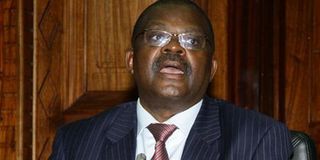Njeru Githae brushes off criticism over 'tribalism' during diaspora forum

Kenya's ambassador to the United States, Robinson Njeru Githae, at a past event. FILE PHOTO | NATION MEDIA GROUP
What you need to know:
- Mr Githae said he had no control over who spoke at the meeting as the speakers represented different sets of Kenyans from different regions.
- One of the participants had wondered aloud why those chosen to represent the diaspora at the meeting were all of the same gender and from one ethnic community.
- During the meeting, Mr Matiang’i delivered President Kenyatta’s message and answered questions from those present.
ATLANTA, GEORGIA
Kenya’s envoy to the United States has defended himself following accusations of tribalism and gender imbalance during a recent diaspora meeting in Los Angeles, California.
On Saturday, Mr Robinson Njeru Githae was criticised by a section of Kenyans living in the US, seeking to know why the diaspora representatives who spoke at the forum were from one ethnic group.
In a statement, Kenyan California Union (KCU) chairman Bramwel Ondiek asked the envoy to explain the criteria used to pick the speakers at the meeting held at the Lax Hilton Airport Hotel.
But speaking to the Nation from Los Angeles on Wednesday, Mr Githae said he had no control over who spoke at the meeting as the speakers represented different sets of Kenyans from different regions.
“Different Kenyan associations within the West Coast chose their speakers and it would have been odd to call them and say so and so should not speak because he is from this or that tribe,” he said in a phone interview.
WELL REPRESENTED
During the meeting, one of the participants, Dr Johnson Kiriaku Kinyua, kicked off the storm when he wondered aloud why those chosen to represent the diaspora at the meeting were all of the same gender and from one ethnic community.
“That desk up there is well represented,” said Mr Kinyua, referring to the high table where Cabinet Secretary Fred Matiang’i sat together with other government officials and private sector players.
“It is very diverse, but I noted that the people who spoke today on behalf of the diaspora were all men and were all from one tribe. I think we need to recognise the diversity that is in the United States,” added the adjunct professor at St Leo University in California.
In response to Dr Kinyua, Mr Githae sought to exonerate himself and blamed the local event organisers for failing to take the gender and tribal balance into account.
On Monday, Mr Ondiek said the embassy was shying away from facing critics.
“We are convinced that this was a deliberate effort to shut out those who may be of divergent opinion on issues,” he said in a statement.
“We can’t believe that this is happening in this day and age,” he added.
The three speakers in question were Mr King’ori Kanyi, Mr Joseph Karanja and Mr Paddy Mwaura.
'TRIBAL LENSES'
On Wednesday, Mr Githae said the number of Kenyans who had registered to attend the event fell significantly upon learning that President Uhuru Kenyatta would not be there.
“But I would also like to appeal to Kenyans in the US to stop viewing every little aspect through tribal lenses,” he said, adding: “Why don’t they also say that we had a very fruitful session or that the people who asked questions were from diverse backgrounds?”
He explained that one of the key speakers from a different ethnic group failed to turn up and was replaced by Mr Paddy Mwaura.
During the meeting, Mr Matiang’i delivered President Kenyatta’s message and answered questions from those present.
Others who spoke included MPs Ken Obura and Ndung’u Gethenji. Others were Safaricom CEO Bob Collymore, Toyota East Africa chairman Dennis Awori and renowned scholar Ngugi wa Thiong’o.
The criticism comes at a time when some Kenyans have expressed scepticism over an announcement by Mr Githae that the government would soon open five new consulates in the United States in preparation for the 2017 general elections.
(Read: Row over planned US poll centres)





